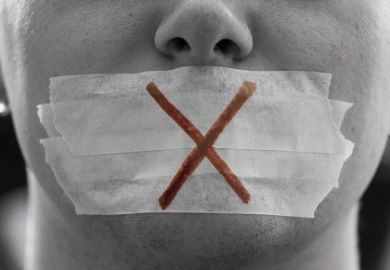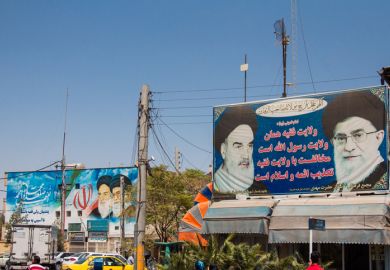Countries that are home to 37 per cent of the world’s population have seen a significant fall in academic freedom over the past decade, according to the latest global assessment.
Data collected for the third Academic Freedom Index show a substantial and statistically significant decline in academic freedom in 19 countries, including academic heavyweights such as the US and UK.
“Being bastions of academic freedom and scientific excellence do not protect the state of academic freedom without continuous support from inside academia and politics,” an author of the report, Lars Pelke, told Times Higher Education.
The index scores countries between zero and one based on five indicators: the freedom to research and teach; the freedom of academic exchange and dissemination; institutional autonomy; campus integrity; and the freedom of academic and cultural expression.
“The level of academic freedom enjoyed by the average global citizen is down to a level last reported in the 1980s,” write Dr Pelke and the co-authors of the 2022 report, Katrin Kinzelbach, Staffan Lindberg and Janika Spannagel.
“Asia and the Pacific has been thrown back to a level of academic freedom last registered in the region around 1978; Latin America returns to a situation last recorded in 1987; while Eastern Europe and Central Asia has fallen to a record low since the fall of the Iron Curtain.”
On average, academic freedom started to decline globally around 2008, although the aggregate uncertainty in calculating this means it is impossible to quantify the exact change over the past decade.
The most precipitous drop in freedoms was seen in Hong Kong, which lost more than 0.56 points, falling to 0.208 in 2021. The index plots the territory’s fall as beginning with a dip in institutional autonomy and academic expression in 2010, followed by a more general decline in freedoms.
Brazil, Turkey and Thailand also each lost more than 0.4 points, which the authors said indicated that they were “potential danger zones” for researchers and students. Significant declines in India and Russia mean that 37 per cent of the world’s population is living under declining academic freedom.
The authors link declines in academic freedom with similar damage to democracy worldwide. Among the 19 countries with major losses in the former, 16 also saw a statistically significant decline on democratic indicators.
“Although freedom of expression and academic freedom are by no means identical concepts, they are of course related,” the authors write, noting that this area of overlap with democracy was the academic freedom indicator that on average dropped the most.
“We need more research that looks at whether autocratisation and major declines in academic freedom are mutually reinforcing, or whether one of these two trigger the onset of a decline,” said Dr Pelke. “In light of the ongoing global deterioration in democracy, more scholarship is highly relevant.”
This edition of the index is based on contributions from 2,056 country experts, designed to gather the reality of academic freedom rather than legal protections that may not exist in practice.
Germany tops the list, with the top 10 per cent countries dominated by Europe and South America. North Korea has the lowest academic freedom, while the rest of bottom 10 per cent includes Syria, Belarus, Laos, Saudi Arabia, Turkey and China.
Register to continue
Why register?
- Registration is free and only takes a moment
- Once registered, you can read 3 articles a month
- Sign up for our newsletter
Subscribe
Or subscribe for unlimited access to:
- Unlimited access to news, views, insights & reviews
- Digital editions
- Digital access to THE’s university and college rankings analysis
Already registered or a current subscriber?







